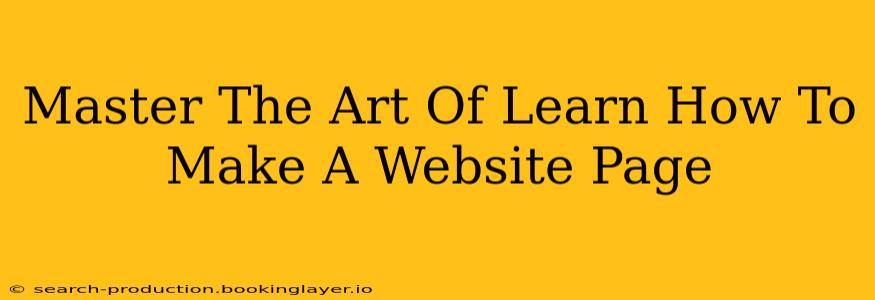Creating a website page might seem daunting, but with the right approach and a structured learning process, you can master the art of web page creation. This guide breaks down the process into manageable steps, empowering you to build engaging and effective web pages.
Understanding the Fundamentals: Before You Start Building
Before diving into the technical aspects, it's crucial to understand the foundational elements of web page creation. This includes:
1. Defining Your Purpose and Audience:
- What's the goal of your web page? Is it to sell a product, share information, or build a community? A clear purpose guides your design and content choices.
- Who is your target audience? Understanding your audience informs the tone, style, and content you present. Consider their age, interests, and technical proficiency. Knowing your audience is paramount.
2. Planning Your Content and Structure:
- Content is King: What information will you present? Organize your content logically using headings (H1, H2, H3, etc.) and subheadings for clarity and SEO.
- Structure is Queen: How will you arrange this content? A well-structured page enhances user experience and readability. Consider using visual elements like images and videos to break up text.
- Keyword Research: This is vital for SEO. Identify relevant keywords related to your page's content. Use tools like Google Keyword Planner to find high-volume, low-competition keywords. Strategic keyword integration is essential.
Choosing Your Tools: The Building Blocks
Several tools and platforms facilitate website page creation, each with its strengths and weaknesses:
1. Website Builders (e.g., Wix, Squarespace):
These platforms are user-friendly and require no coding knowledge. They offer drag-and-drop interfaces, making it easy to design and customize your pages. Ideal for beginners, but customization options may be limited.
2. Content Management Systems (CMS) (e.g., WordPress):
CMS platforms offer greater flexibility and control. WordPress, the most popular CMS, allows for extensive customization through themes and plugins. Requires a slightly steeper learning curve but provides greater scalability and control. WordPress is a powerful, versatile option.
3. Coding (HTML, CSS, JavaScript):
For complete control and maximum customization, you can build your website page from scratch using HTML, CSS, and JavaScript. This requires significant coding knowledge and experience, but it allows you to create highly unique and tailored designs. Coding offers unparalleled control, but requires significant skill.
Designing Your Web Page: The Art of Presentation
Once you've chosen your tools and planned your content, it's time to focus on design:
1. User Experience (UX) Design:
Prioritize ease of navigation and user-friendliness. A well-designed page keeps visitors engaged and encourages them to explore further. A positive UX significantly impacts user engagement.
2. Visual Appeal:
Use high-quality images and videos to enhance the visual appeal of your page. Ensure your design is consistent with your brand identity and target audience.
3. Responsiveness:
Your web page must be responsive, adapting seamlessly to different screen sizes (desktops, tablets, smartphones). Responsiveness is crucial for a positive user experience.
Mastering SEO: Enhancing Visibility
Search Engine Optimization (SEO) is crucial for ensuring your website page ranks well in search engine results:
1. On-Page Optimization:
This involves optimizing elements within your web page, including keyword integration, meta descriptions, title tags, and image alt text.
2. Off-Page Optimization:
This focuses on building your website's authority and credibility through techniques like link building and social media promotion. A holistic SEO approach is key to visibility.
Conclusion: Your Journey to Web Page Mastery
Creating a successful website page is an iterative process. By following this guide and continuously learning and adapting, you can master the art of web page creation, building compelling online experiences that engage your audience and achieve your goals. Remember, consistent effort and attention to detail are key to success.

